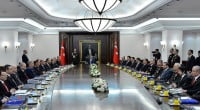Paris attacks, New Turkey and oppressing Hizmet

Date posted: December 14, 2015
ŞERAFETTİN PEKTAŞ
After the barbaric terrorist attacks in Paris, daily life in many European cities has been substantially challenged.
The level of threat is still high. Soldiers and police continue to patrol the streets. Authorities tend to cancel large-scale events. People feel concerned about having dinner out with friends, going to a concert or attending a sports match. The headlines in newspapers and on screens are full of analyses about the “war on ISIL [the Islamic State in Iraq and the Levant],” the identities of the attackers, the causes of radicalization among youth in Europe and concerns over the rise of xenophobia and Islamophobia that may ensue as a result of these attacks. It seems that we are now heading toward a new Europe and we are witnessing greater antagonism toward Muslims and Islam.
On the other side of Europe, in the New Turkey — as it is called by President Recep Tayyip Erdoğan and the Justice and Development Party (AKP) government — the police keep raiding and expropriating various media and business organizations in the name of fighting terrorism. Most recently, Kaynak Holding, a profit-making business conglomerate that includes over 8,000 employees and 100 brands, was stormed by hundreds of police officers with armored police vehicles and water cannons on standby in order to force the group into administration by appointing government-friendly trustees. All of this was done with no court hearing on the justification for the act and under the simple directive of a single state prosecutor. What were the alleged grounds for this flagrantly unlawful act? “Supporting a terrorist organization.” It does not seem to bother the prosecutor, or anyone else in the government for that matter, that the organization in question has yet to be declared “terrorist” by a court of law. By appointing administrators, the group now practically belongs to the government.
This is one of the latest moves of President Erdoğan’s self-confessed “witch hunt” of those who are inspired by the Hizmet movement, also known as the Gülen movement for Islamic scholar Fethullah Gülen. The holding company is sympathetic to Hizmet, which has been persecuted by the Turkish government since December 2013 when a number of corruption investigations went public, implicating the close circle of then-Prime Minister Erdoğan. The graft probes were all closed down thanks to recent legislation that virtually put the judiciary under Erdoğan’s control. The 2015 EU Progress Report on Turkey criticizes such legislation and states that judges and prosecutors are “under strong political pressure.” It is no surprise that these judges and prosecutors have initiated several investigations of sympathizers of the Hizmet movement, culminating in an accusation that it is an “armed terrorist organization.” Interestingly, no convincing evidence is yet available that would substantiate such a huge claim. Furthermore, a recent report by notable British lawyers demonstrated that “the Turkish government has perpetrated systematic human rights violations,” targeting those inspired by the movement in the past two years. It is public knowledge that Erdoğan chose the movement, once an ally in defying the Kemalist establishment, and used it as a scapegoat on his way to grab more power in his New Turkey. It was also intimidation of others who might question his way of ruling.
A relevant question here is, “What is the connection between the recent Paris attacks and the confiscation of Kaynak Holding?” The answer lies in the possible consequences of the persecution of a Muslim movement, which has considerable capacity to counter among Europe’s Muslim youth the violent extremist ideologies that are claiming Islamic justification.
Among the companies of Kaynak Holding are several publishing houses that publish many books and magazines that reflect the human-centered, Sufi-oriented, inclusive Sunni teachings of the movement in Turkish, English, Arabic, Urdu and many other languages. These publications address a wide audience that ranges from children to young people, from the religious to the less-observant and are often best-sellers in Turkey. The holding also publishes a popular-theological journal in Turkish and another one in Arabic, which has been successful in attracting the attention of leading Arab scholars, particularly in North Africa. The holding’s companies also translate (into several languages), publish and distribute the works of Gülen. The newly-appointed trustee put virtually an end to the sale of Gülen’s book, as he ordered them, surprisingly and again with no court order, to be removed from the shelves of bookstores belonging to Kaynak Holding.
Mr. Gülen is often acknowledged for his unequivocal stance against the instrumentalization of religion in politics and his emphasis on diversity, freedom of belief for all, human rights and integration with the wider world. He categorically condemned violence and suicide bombings long before 9/11. Last year, he issued a statement denouncing the atrocities of ISIL in several European newspapers. He was also a pioneer of interfaith dialogue whose initiatives brought more legitimacy to non-Muslim minorities in the skeptical eyes of many conservative Muslims in Turkey. He also had a private audience with the late Pope John Paul II in Rome in 1998.
The movement he initiated is now active in more than 160 countries in various types of schools and NGOs that are often appreciated for teaching mutual respect and understanding, particularly in conflict-ridden parts of the world. It has also been present in the Middle East and North Africa (MENA) region for years and has increasing visibility among Arab-speaking opinion-makers. More particularly, as a recent report documented, the teachings and practices of the movement undermine violent extremism among Muslims. With its proactive approach, labeled “de-radicalization by default,” Hizmet not only produces an Islamically authentic, positive counter-narrative, but also exemplifies a model of modern Islamic activism that is mutually exclusive with any and every form of violent extremist tendency. Furthermore, although publicly demonized and suppressed in its native country, the movement still has the highest intellectual and social capital to tackle the radicalization phenomenon, when compared to other moderate religious groups in Turkey where a recent Pew survey found that 8 percent of the Turkish population views ISIL favorably, with 19 percent undecided and 27 percent who do not have an unfavorable view of the throat-slitting, women-raping, hatred-spewing terrorist group that is ISIL. This is a surprising figure for such a country as Turkey, which has recently been hit several times by ISIL. This warns that there is a lot to do in Turkey in terms of fighting extremism and it is not wise to maltreat a significant religio-social actor such as the Hizmet movement, whose contribution is much needed.
For Europe, on the other hand, Turkey is now a key country. The EU summit last Sunday officially handed over to Turkey the real burden in tackling the refugee crisis. The refugees from Syria are about to cause a seismic shift in the near future in European domestic and foreign politics. This explains the recent “re-energizing” of relationships between the EU and Turkey, and the concomitant condonation with regard to certain aspects of Erdoğan’s authoritarian rule. Erdoğan, as an incredibly successful negotiator, seems to have seized the opportunity. The EU similarly tends to handle negotiations with Turkey as a win-win situation. EU leaders most probably have made a cost-benefit analysis and may have decided to turn a blind eye to the breaches of human rights, the usurpation of the law, media freedom and private property in new Turkey. This may tell us why European voices are more silent on the raids on media institutions, the arrests of journalists, the confiscation of companies as well as the suppression of a movement that may truly help in countering terrorism that has now started to hit home. At this point, we should hope that they also assess the opportunity cost of Erdoğan’s opportunism. Otherwise, among the next suicide bombers there might be one who is perhaps not “sans papiers” and who comes not all the way from Syria, but from İstanbul or Adiyaman with a valid Turkish passport.
* Dr. Pektaş holds Ph.D. in Islamic studies from the University of Leuven and is currently the academic director of the Dialogue Platform in Brussels.
Source: Today's Zaman , December 13, 2015
Tags: Defamation of Hizmet | Hizmet (Gulen) movement |
























